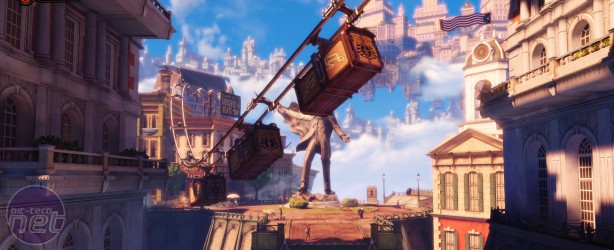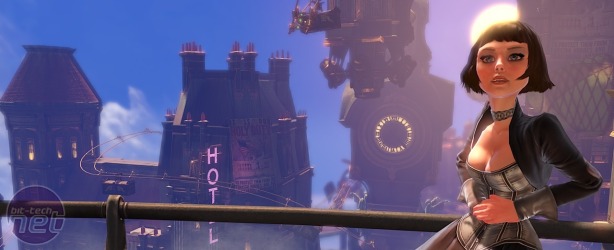
Bioshock Infinite review
Publisher: 2k GamesDeveloper: Irrational Games, 2K Marin, Human Head Studios
Price UK: £26.98
The original Bioshock was a seminal work that set a new benchmark for narrative in games. It was a cut above the usual pulp that the medium leverages just to progress the player from one gameplay location to another. The narrative actually became a selling point and a reason to pay attention to Bioshock in it’s own right. It was a game that could claim to be about something. Not that it just told an interesting tale; it used that story to explore ideas about culture, politics and even on the most meta level, game design itself.
Being a shining example in that respect wasn’t it’s only success. It took place in the unique setting of the underwater city of Rapture, the art design of which leaned on the previously underutilised style of art-deco, and it had an approach to combat that melded careful contemplation while setting-up and fast paced action in the actual brawl. It wasn't flawless - it dragged a little in the middle - but it was unequivacolly a masterpiece.
Bioshock Infinite matches the past game in so many ways and surpasses it entirely in others.

There's no connective tie with the previous game save the steampunk/art-deco style. The sunken dystopia of Rapture is left behind and instead the player is hurled into Columbia, a man-made floating haven in the sky, set in fantastical version of 1912. Columbia is a city that embodies a specific take on American culture, one that’s highly Christian-conservative and treats the nation’s founders almost like deities in their own right. It’s a city that’s built with a clear racial and class divide, not straying away from the reality of the time. In the hands of a worse team, this treatment would be highly controversial, but it’s handled so impeccably and it’s so necessary to the plot’s themes that it absolutely justifies itself.
Your character Booker’s trip to Columbia is in the interest of retrieving a girl, Elizabeth, from captivity. It’s imperative that you find her so that you can clear a pile of debts, but it’s increasingly clear as your time in columbia continues that this isn’t a simple hero's tale. Elizabeth has the power to control “tears in reality" that are popping up all over the city. Their prevalence has shaped the timeframe’s understanding of mechanisation - leading to modern conveniences like vending machines and automated robotic weaponry - as well as the city's culture. You’ll hear timely appropriate renditions of modern songs like a barbershop quartet singing God Only Knows or hearing panpipe fairground cover of Girls Just Wanna Have Fun, leaving you trying to place if that really is the melody you think it is. All of this lends to the sense of unease and feeling that things are just a little out of place.

Moments where the game slows down and you have a chance to take in this content are where Infinite truly shines. The detail in making this world seem fully realised is staggering. You’ll see people go about their day, holding conversations and interacting in ways that are far exceed what we've come to expect from games. This attention to proper pacing breaks up the long combat-heavy sections and keeps them from dominating the entire experience.

MSI MPG Velox 100R Chassis Review
October 14 2021 | 15:04









Want to comment? Please log in.